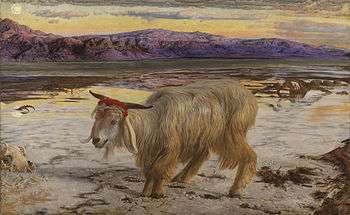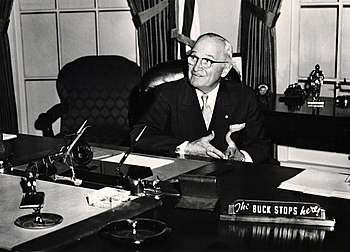Buck passing
Buck passing, or passing the buck, or sometimes (playing) the blame game, is the act of attributing to another person or group one's own responsibility. It is often used to refer to a strategy in power politics whereby a state tries to get another state to deter or fight an aggressor state while it remains on the sidelines.[1]

Etymology
The expression is said to have originated from poker in which a marker or counter (such as a knife with a buckhorn handle during the American Frontier era) was used to indicate the person whose turn it was to deal. If the player did not wish to deal he could pass the responsibility by passing the "buck," as the counter came to be called, to the next player.[2]
In international relations
Passing the buck in international relations theory involves the tendency of nation-states to refuse to confront a growing threat in the hopes that another state will. The most notable example was the refusal of the United Kingdom, United States, France, or the Soviet Union to confront Nazi Germany effectively in the 1930s. With the Munich Agreement, France and the United Kingdom avoided armed confrontation with Germany, passing the buck to the Soviet Union, which then passed the buck back to the western powers by signing the Molotov–Ribbentrop Pact.[3]
Similarly, John Mearsheimer argues that the delay of the Normandy Invasion shows that a buck passing state can shift the balance of power in its favor: "There is no question that the United States benefited greatly from delaying the Normandy invasion until late in the war, when both the German and the Soviet armies were battered and worn down. Not surprisingly, Joseph Stalin believed that the United Kingdom and the United States were purposely allowing Germany and the Soviet Union to bleed each other white, so that those offshore balancers [the United States and the United Kingdom] could dominate postwar Europe."[4]
"The buck stops here"

"The buck stops here" is a phrase that was popularized by U.S. President Harry S. Truman, who kept a sign with that phrase on his desk in the Oval Office.[5] The phrase refers to the notion that the President has to make the decisions and accept the ultimate responsibility for those decisions. Truman received the sign as a gift from a prison warden who was also an avid poker player. It is also the motto of the U.S. Naval Aircraft Carrier USS Harry S. Truman (CVN-75).[6]
President Jimmy Carter arranged to borrow the sign from the Harry S. Truman Presidential Library and Museum.[7] Footage from Carter's "Address to the Nation on Energy"[8] shows the sign on the desk during his administration.
The reverse of the sign reads, "I'm from Missouri."[5] This is a reference to Truman's home state as well as Willard Duncan Vandiver's statement: "I'm from Missouri. You've got to show me."
See also
| Look up buck passing in Wiktionary, the free dictionary. |
References
- John, Mearsheimer (2001). The Tragedy of Great Power Politics. New York: W. W. Norton & Company. pp. 157–58. ISBN 9780393076240.
- Mitford M. Mathews, ed., A Dictionary of Americanisms on Historical Principles (Chicago, University of Chicago Press, 1951), I, pp. 198–99.
- Christensen, Thomas; Jack Snyder (1990). "Chain Gangs and Passed Bucks: Predicting Alliance Patterns in Multipolarity" (PDF). International Organization. 44 (2): 137–68. doi:10.1017/S0020818300035232. Archived from the original (PDF) on September 7, 2008. Retrieved June 6, 2017.
- John, Mearsheimer (2001). The Tragedy of Great Power Politics. New York: W. W. Norton & Company. p. 160. ISBN 9780393076240.
- "Truman: The Buck Stops Here". trumanlibrary.org.
- Jan R. Van Meter, Tippecanoe and Tyler Too: Famous Slogans and Catchphrases in American History.
- "'Buck Stops Here' To Be Sign of Carter". The New York Times. 6 February 1977. Retrieved 30 August 2016.
- President Jimmy Carter – Address to the Nation on Energy. YouTube. 28 March 2008.